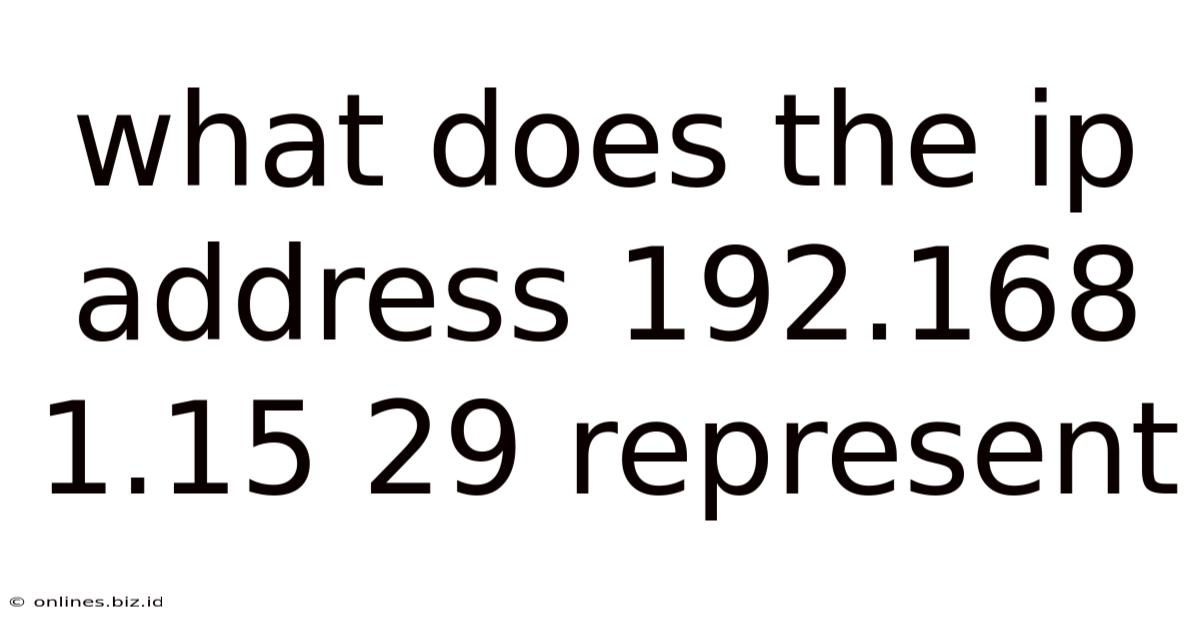What Does The Ip Address 192.168 1.15 29 Represent
Onlines
May 10, 2025 · 4 min read

Table of Contents
What Does the IP Address 192.168.1.15.29 Represent? A Deep Dive into IP Addressing
The IP address 192.168.1.15.29, at first glance, seems like a standard internet protocol address. However, the presence of the extra ".29" segment immediately signals that this isn't a valid IPv4 or IPv6 address. This article will dissect this unusual notation, explore the potential meanings, and clarify what it might represent, focusing on common misinterpretations and offering a clear understanding of proper IP address structure.
Understanding Standard IP Addresses
Before diving into the anomaly, let's refresh our understanding of standard IP addresses. The internet relies on IP addresses to uniquely identify devices connected to a network. There are two main versions:
IPv4 Addresses
IPv4 addresses are 32-bit numbers typically represented as four decimal numbers separated by periods (e.g., 192.168.1.1). Each number ranges from 0 to 255. This system allows for billions of unique addresses, but with the proliferation of internet-connected devices, it's becoming increasingly scarce.
IPv6 Addresses
IPv6 addresses are 128-bit numbers represented using hexadecimal notation, often separated by colons (e.g., 2001:0db8:85a3:0000:0000:8a2e:0370:7334). IPv6 addresses provide a vastly larger address space, addressing the limitations of IPv4.
Deconstructing 192.168.1.15.29: The Problem with the Extra Segment
The key issue with "192.168.1.15.29" is the extra ".29" segment. Neither IPv4 nor IPv6 addresses use five octets (sets of eight bits). This suggests the address is not a standard IP address in the way we typically understand it. Let's explore potential explanations:
1. Misinterpretation or Typographical Error
The most likely scenario is a simple mistake. Someone might have:
- Added an extra number unintentionally: A typo, a misunderstanding of the address structure, or a simple human error during data entry.
- Confused it with another identifier: The string might be part of a more complex identifier that includes an IP address and an additional element. This additional element could represent a port number, a device ID within a network, or some other internal designation.
2. Internal Network Addressing Scheme
Some organizations or networks might employ custom internal addressing schemes, deviating from the standard IPv4 or IPv6 format. The ".29" segment could represent something specific within their internal system, such as a subnet division or a device identifier within a particular range. However, without context about the specific network, this is pure speculation.
3. Part of a Larger Data String
The "192.168.1.15.29" might be a fragment of a larger data string. It might not be an IP address at all, but a portion of a longer code, identifier, or log entry that includes numerical data that accidentally resembles an IP address.
4. Software Bug or Data Corruption
In specific scenarios, corrupted data or a software glitch could lead to incorrect or incomplete data representation, resulting in an unusual string of numbers similar to "192.168.1.15.29".
Investigating the Potential Meaning: Context is King
Without additional context, pinning down the precise meaning of "192.168.1.15.29" is impossible. To understand what it might represent, we need to consider:
- The Source of the Address: Where did you find this address? Was it in a log file, a network configuration file, a database entry, or a diagnostic tool output? The source can provide crucial clues.
- The Associated System or Network: What network or system is it potentially related to? A router's configuration, a specific device's settings, or an application’s logs are all important pieces of information to locate.
- The Surrounding Data: What other data is included alongside the "192.168.1.15.29" string? Are there timestamps, error messages, or other identifying details?
Practical Implications and Troubleshooting
If you encountered this address during network troubleshooting, it's crucial to:
- Verify the accuracy of the address: Double-check the data source, ensuring no typos or errors occurred.
- Analyze related logs: Look at the logs of your router, network devices, and applications for additional context and clues.
- Check network documentation: Review any network documentation or diagrams to see if this address is used in any internal or custom addressing schemes.
- Consult network administrators: Contact your network administrators for assistance; they likely have the necessary insight into your organization's network setup.
Conclusion: The Importance of Valid IP Addressing
While "192.168.1.15.29" isn't a valid standard IP address, understanding its context is essential. The most likely explanation is a simple error, misinterpretation, or a part of a larger data string unrelated to traditional IP addressing. The key takeaway is the importance of adhering to standard IP address formats (IPv4 and IPv6) and thoroughly investigating any anomalies during network troubleshooting or data analysis. Precise and accurate IP address information is vital for the reliable functioning of any network. Always double-check your addresses, and refer to official network documentation if necessary. Never hesitate to ask for help from experienced network professionals if you're unsure.
Latest Posts
Latest Posts
-
What Is True Of A Mixture Brainpop
May 10, 2025
-
The Power Of Open Ended Play Answer Key
May 10, 2025
-
Pedigree Practice And Pedigree Construction Answer Key
May 10, 2025
-
Analyze The Mood And Tone Of Winter Dreams
May 10, 2025
-
Choose Which Function Is Represented By The Graph Apex
May 10, 2025
Related Post
Thank you for visiting our website which covers about What Does The Ip Address 192.168 1.15 29 Represent . We hope the information provided has been useful to you. Feel free to contact us if you have any questions or need further assistance. See you next time and don't miss to bookmark.